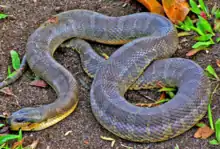Homalopsis buccata
Homalopsis buccata (puff-faced water snake or masked water snake) is a species of water snake in the Homalopsidae family found in tropical areas of Southeast Asia.
| Puff-faced water snake | |
|---|---|
 | |
| Scientific classification | |
| Kingdom: | Animalia |
| Phylum: | Chordata |
| Class: | Reptilia |
| Order: | Squamata |
| Suborder: | Serpentes |
| Family: | Homalopsidae |
| Genus: | Homalopsis Kuhl and Hasselt, 1822 |
| Species: | H. buccata |
| Binomial name | |
| Homalopsis buccata | |
Description
Upper labials 1–4 contact single loreal; two prefrontals; 33–40 dorsal scale rows at mid-body, usually reduced to fewer than 30 posteriorly; one postocular plus a postsubocular; 12 (11–14) upper labials; ventral count fewer than 166. Homalopsis hardwickii has a divided loreal; H. nigroventralis has upper labials 1–3 contacting the loreal; H. semizonata has a divided or fragmented loreal contacting upper labials 1–4 or 1–5 and three prefrontals; H. mereljcoxi, has a single loreal contacting upper labials 1–4, scale rows at mid-body 40–47, reduced to 30 or more posteriorly.[1] This snake has banded pattern and usually reach 1 meter (3 feet) in length. They have somewhat similar body build with anaconda, but doesn't use constriction to subdue their prey, they use their mild venom to subdue their prey through their grooved rear fang.
Distribution
Homalopsis buccata ranges from northern Sumatra to Salanga Island, Indonesia and Borneo; it is present on the Malaysian peninsula and in extreme southern Thailand (vicinity of Pattani).[2]
Reproduction
Homalopsis buccata are ovoviviparous, meaning they do not lay eggs, but rather give birth to live young. Female Homalopsis give birth to 2-20 live young, with an average of 9.26 young per breeding. Studies have not shown this species breeds year round, with a peak season of October–March, though no distinctive breeding season was found, with young being born throughout the year.[3]
Diet
Prey items are said to include: Tilapia, Guppies (Lebistes), Catfish (Mystus) Asian Swamp Eels (Fluta alba), various other small fish Fish, a variety of frogs, freshwater crustaceans.[4]
In captivity, the species feeds readily on minnows, goldfish, various cichlid fish, Tilapia, Mollies (Poecilia), and tadpoles.
Notes
- Murphy, John C. 2007. Homalopsid Snakes: Evolution in the Mud. Krieger Publishing, Malabar, Florida, 249 pp.
- MURPHY, JOHN C.; HAROLD K. VORIS, B.H.C.K. MURTHY, JOSHUA TRAUB & CHRISTINA CUMBERBATCH 2012. The masked water snakes of the genus Homalopsis Kuhl & van Hasselt, 1822 (Squamata, Serpentes, Homalopsidae), with the description of a new species. Zootaxa 3208: 1–26
- Berry, P. Y., & Lim, G. S. (1967). The Breeding Pattern of the Puff-Faced Water Snake, Homalopsis buccata Boulenger. Copeia, 1967(2), 307.
- Voris, H. K., & Murphy, J. C. (2002). The prey and predators of Homalopsine snakes. Journal of Natural History, 36(13), 1621–1632.
References
- Boulenger, George A. 1890 The Fauna of British India, Including Ceylon and Burma. Reptilia and Batrachia. Taylor & Francis, London, xviii, 541 pp.
- Stuart, B.L.; Smith, J.; Davey, K.; Din, P. & Platt, S.G. 2000 Homalopsine watersnakes. The harvest and trade from Tonle Sap, Cambodia. Traffic Bull. 18 (3): 115-124
